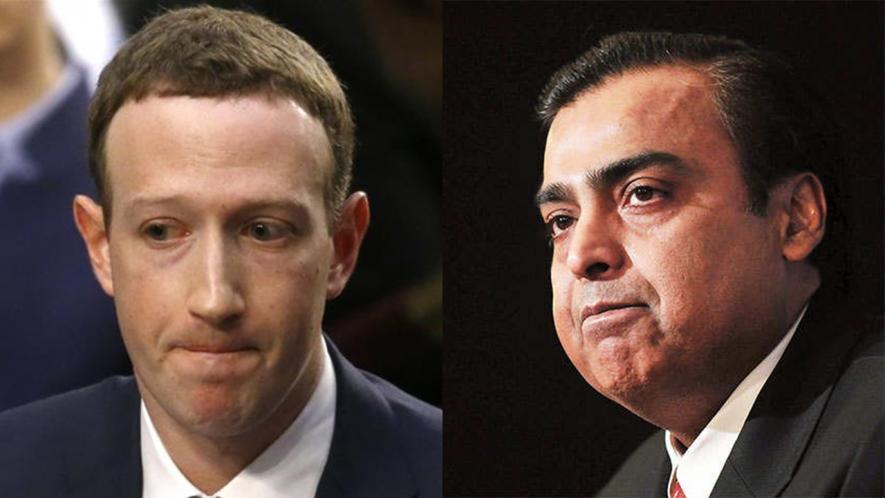Is Reliance’s Rights Issue Over-Valued?

From May 20 till June 3, Reliance Industries Limited (RIL) will conduct what is being touted as India’s “biggest ever” rights issue, seeking to raise at least US$7 billion (or Rs 53,215 crore). Every eligible shareholder in the company will be entitled to purchase one discounted share for every fifteen shares they hold. The fundraising effort is the latest step in RIL’s effort to become “debt-free.”
Over the past three months, as India and the world has grappled with the Covid-19 pandemic, a devastating lockdown and a severe economic disruption, the country’s biggest private corporate entity headed by the richest Indian Mukesh Ambani, has struck a number of significant deals to raise Rs 67,195 crore by selling stakes in its telecommunications and internet data business––Reliance Jio (RJio)––which is a subsidiary company of the parent RIL.
[RJio is India’s largest, and the world’s third largest, mobile network operator in terms of number of subscribers. RIL, a widely diversified multinational entity with interests in oil refining and marketing, oil and gas exploration, petrochemicals, textiles, retail and telecom, is the country’s largest company whose shares are publicly traded in terms of market capitalisation and also one of the most profitable. Its annual revenue is currently around $90 billion or approximately Rs 6.75 lakh crore.]
A look at the deals recently struck by the Reliance group, including the one with Facebook Inc. of the US, one of the world’s largest digital media conglomerates, reveal that RJio, on the strength of which RIL is able to raise these substantial amounts––both through private stake sales and by means of the rights issue of shares––may be considerably over-valued. If indeed this is the case, it would mean that RIL’s share price is over-valued as well and the company’s shareholders who will be purchasing the “discounted” shares being offered in the rights issue would be over-paying.
We present arguments for this claim in this article.
Mukesh Ambani’s plan to become “debt-free”
At the 42nd Annual General Meeting of Reliance Industries Limited held in Mumbai on 12 August 2019, Mukesh Ambani had announced that the company has “a very clear roadmap to becoming a zero net debt company within the next 18 months, that is by March 31, 2021.” At that time, RIL had just closed the previous financial year with a total debt of Rs 1.54 lakh crore.
A week earlier, on 5 August, global brokerage house Credit Suisse had downgraded RIL’s stock to the category “under-perform” and had cut the target price for its stock from Rs 1,350 to Rs 995. This meant the firm’s analysts were predicting that RIL would under-perform in the coming months and expected its stock price to fall. Such reports play a major role in how investors perceive the worth of the company’s shares and, as a result, how the stock fares in the market.
Credit Suisse had based its assessment on RIL’s rising debts and interest costs in the previous four years, and on the expectation that RIL’s profit margin from its core revenue generating business (refining crude oil) would reduce due to rising liabilities and lower earnings due to falling oil prices, and that RIL would face pressure on financing two of its other major businesses that were yet to break even––Reliance Jio and the East-West gas pipeline (intended to transport natural gas from the RIL-controlled Krishna-Godavari (KG-D6) natural gas block off the coast of Andhra Pradesh, to Gujarat in western India).
Accounting for its reasons for downgrading RIL’s stock, the Credit Suisse report of August had said RIL faced
(1) higher liabilities of $10 billion from crude payables, JioPhone financing and East-West pipeline;
(2) multiple cuts and lower earnings for refining;
(3) slow enterprise roll-out and weak Jio ARPU (average revenue per user) in Q1FY20 (first quarter of the financial year ending March 31, 2020).”
The report added: “RIL has been free cash flow (FCF) negative for six years and given margin pressure in refining and petrochemical (high supply), FCF should be negative for FY20-21. Total liabilities are already up from $19 billion (FY15) to $65 billion (FY19) (debt, higher crude payables, customer advances, capex creditors, spectrum liabilities, JioPhone financing and East West [EW] pipeline) and are 40 percent of enterprise value.”
A week after Ambani’s speech on August 12, Credit Suisse did a U-turn, upgrading RIL’s stock from “under-perform” to “neutral” and raising the target price of each share to Rs 1,210. This was based on “the strong outlook from Mukesh Ambani in his speech,” the international brokerage house said in a statement on 19 August.
In his speech, Ambani had announced that two major upcoming deals were in the works: an investment in RIL’s oil refining business worth $75 billion by Saudi Arabia’s Saudi Aramco––one of the largest and most-profitable companies in the world––to acquire 20% of the group’s interests in oil and petrochemicals, and an investment in RIL’s natural gas division by British Petroleum (with which it was already in a partnership).
He said: “We expect to complete these transactions within this financial year subject to definitive agreements, due diligence, regulatory and other customary approvals. The commitments from these two transactions are about Rs 1.1 lakh crore.”
Plan Develops Snags
By February 2020 however, multiple snags had placed hurdles in the way of RIL’s roadmap to becoming “debt-free.”
In December 2019, in an unusual step, the Union government (though the Ministry of Petroleum and Natural Gas) had urged the Delhi High Court to restrain the Saudi Aramco investment deal from moving forward. This was because the government was in a dispute with RIL and an Indian associate of the multinational corporation Royal Dutch Shell over payments the government claimed was owed to it for natural gas drilled from the Panna-Mukta and Tapti oilfields off the coast of Mumbai, of which the two companies were contractors.
The government has alleged that the two companies had wrongly accounted for costs and profits in the oil and gas fields thereby reducing the income to the exchequer, and had taken them to an international arbitration tribunal. It was due to the ongoing proceedings at that tribunal that the government approached the high court requesting that the Saudi Aramco deal be stopped, to ensure that RIL would have sufficient assets to pay the government the amount it claimed, were it to prevail over the company once the arbitration concluded.
Though Shell and RIL were declared to have “won” the arbitration in February the governments’s actions had delayed, if not stalled the Aramco investment outright. Reports since then have indicated that the deal is still “on track” and “under due diligence” while others have claimed that low crude price and the Covid-19 pandemic may delay it further.
Another major hurdle facing RIL was a tax investigation that had been launched on the company’s promoters, the Ambani family. The investigation that these authors have been tracking in multiple earlier reports, was based on documents leaked from the HSBC bank by a whistleblower and information received from a number of foreign authorities, on the basis of which the government claims that members of the Ambani family had evaded taxes payable on funds held abroad. Additional allegations that the funds had been routed into India and into Reliance group companies through channels designed to hide the transactions from government oversight, remain under investigation.
Another hurdle was raised in the Union Budget for 2020-21 presented by Finance Minister Nirmala Sitharaman on February 1. In it she announced that the government was cutting import duty on purified terephthalic acid or PTA. Reliance Industries Limited is the country’s largest producer of the chemical that is used to make polyester yarn, and the duty cut meant that it the company would face significant competition in a segment that it dominated. Sitharaman had announced that the government intended to ensure easy availability of PTA at a competitive price, and hence was scrapping the “protective” duty on the chemical.
As a result of these setbacks, RIL’s stock price, which had soared to a high of Rs 1,602 on December 20, 2019 plunged to a low of Rs 867 on March 23, 2020. It was at this juncture that the government’s measures to tackle the impending economic and public health crisis due to the global Covid-19 pandemic arrived as an unexpected boost to RIL’s plans.
A Covid-19 Rescue Programme?
On March 23, reports appeared in the media that the country’s central bank and apex monetary authority the Reserve Bank of India (RBI) was contemplating certain palliative measures to sustain the flow of money in the economy during the impending economic slowdown that would inevitably result from a protracted lockdown, of which India has entered its fourth phase at the time of writing.
The media reports suggested, citing anonymous sources, that the RBI was considering conducting repurchase operations of corporate bonds, despite this being disallowed by the RBI Act of 1934. Two unnamed sources told Livemint: “We have to work it out. Under the RBI Act, we are not allowed to take any other collateral other than government securities. But we are not looking upon that as an impediment…we will look at ways in which we can directly reach the corporates. We’re saying just give us time to work our way through these regulations and all, but we are indeed looking at directly helping them out.”
Repurchase operations through changes in repo (or repurchase option) rates are a monetary mechanism by which the RBI controls how much money is available with the banks, and thereby how much is available in the market, particularly, how much liquidity is available for banks to lend to companies and investors. Banks borrow money from the RBI by selling it bonds and securities that they hold, with an agreement to repurchase them at a later date, at a rate fixed by the RBI known as the repo rate. Fixing the repo rate is one of the RBI’s important instruments of monetary control––by adjusting it the RBI can affect how much money banks are willing to borrow and thereby how much money is flowing in the economy.
The RBI Act has ensured that only government bonds and securities––considered to be the most secure assets since they are guaranteed by the sovereign––can be bought and sold in repo transactions. According to these media reports, due to the economic crisis facing the country, the central bank may have been considering allowing the use of corporate bonds and securities (effectively stocks of companies like RIL) to also be used by banks and financial institutions for this purpose.
According to the reports, this action that could be construed to be directly contrary to the RBI Act, was being contemplated due to a request by mutual funds companies that are the largest holders of corporate bonds and who had sought the RBI’s intervention due to falling stock prices after March 22.
Stock prices, including the price of RIL’s scrip, rebounded briefly after this speculative “news” about what the RBI may do was aired by media outlets.
The “Reshuffling” of Ambani Family Shares and the Facebook Deal
As these authors reported earlier, in the last week of March, just after the countrywide lockdown was announced by Prime Minister Narendra Modi in the evening of March 24, the RIL’s promoter group undertook a “reshuffling” of its holdings in the company. While the net holdings of the promoter group remained unchanged, a proportion was moved out of the hands of closely-held private LLP (limited liability partnership) entities, and into the hands of members of Mukesh Ambani’s family. The reshuffle and rumours of a stock buy-back by banks led to an increase of 5% in RIL’s share price. The next boost came from media reports the following day, that is, March 23, that the RBI was considering permitting the use of corporate securities in repo transactions. In two days, the RIL stock rose 23% to close at Rs 1,072 on March 25.
Another jump in the prices of RIL’s shares came from the deal between Facebook and Reliance Jio. On April 22, Facebook and RIL announced an investment by the US-based international digital monopoly of $5.7 billion (Rs 43,574 crore) into Jio Platforms, to acquire a 9.9% stake in the Reliance group’s telecommunications business.
Jio Platforms is the parent company of RIL’s various digital and telecommunications companies, including Reliance Jio Infocomm Limited which is the company behind RJio’s internet, mobile, data and television services, and Jio Saavn, Jio Cinema and Haaptik, among others. This was the biggest deal struck by Facebook since its $22 billion buyout of messaging company WhatsApp in 2014. On that day, RIL’s shares surged 10.3%, closing at Rs 1,363.35.
More Investments Into Jio From Silver Lake, Vista Equity Partners & General Atlantic
The Facebook-Jio deal, when announced, had stated that Jio Platforms, the company that Facebook had bought into, was valued at $65.95 billion, or Rs 4.62 lakh crore. Since then, that company has been the vehicle to raise a further Rs 23,621 crore through further stake sales to three American private equity companies. Each investment raised the valuation of Jio Platforms, thereby raising the stock price of the parent company RIL.
The first, announced on May 5, was the sale of a 1.15% stake in Jio Platforms to US private equity firm Silver Lake for Rs 5,655.75 crore ($747 million). A joint statement with RIL stated that the deal assessed Jio Platforms at “an equity value of Rs 4.9 lakh crore and an enterprise value of Rs 5.15 lakh crore,” that is, at a premium of 12.5% over the valuation in the Facebook investment.
Silver Lake, based in California, is a private equity firm that has invested in several major information technology companies including Airbnb, Alibaba, and Alphabet (the parent companyof Google, YouTube and Android). Its managing partner Egon Durban stated that Jio Platforms has “brought extraordinary engineering capabilities to bear on bringing the power of low-cost digital services to a mass consumer and small businesses population.”
The next deal, announced on May 8, was with another American private equity firm named Vista Equity Partners. Vista Equity acquired a stake of 2.32% in Jio Platforms for Rs 11,367 crore. In this deal, Jio Platforms once again was valued at a premium over the Facebook deal, with an equity value of Rs 4.91 lakh crore and an enterprise value of Rs 5.16 lakh crore.
Announcing the deal, Mukesh Ambani stated: “…like our other partners, Vista also shares with us the same vision of continuing to grow and transform the Indian digital ecosystem for the benefit of all Indians. They believe in the transformative power of technology to be the key to an even better future for everyone.”
“In Robert and Brian, whose family hails from Gujarat, I found two outstanding global technology leaders who believe in India and the transformative potential,” he added, referring to Vista Equity’s billionaire founders Robert Smith and Brian Sheth.
Vista Equity is the world’s largest exclusively tech-focused private equity fund.
The third deal, announced on May 18, was with American private equity firm General Atlantic. For Rs 6,598.38 crore, General Atlantic acquired a 1.34% stake in Jio Platforms, once again valuing the company at a 12.5% premium over the Facebook deal.
This was the fourth investment in RJio in less than a month, with a total of Rs 67,194.75 crore entering the coffers of the Reliance group. Effectively, the roadmap to becoming “debt-free” that had been stalled due to the government preventing the Saudi Aramco deal from going through, was back on track. The company’s clear aim is that the RIL rights issue will complete the package of moves.
How Much is RIL Really Worth?
Two market analysts, speaking to these writers on condition of anonymity, raised questions regarding the valuation of RJio that formed the basis of these deals. One of them pointed out that Jio Platforms’ earnings before tax and interest (EBIT) in 2019 was Rs 2,665 crore with 307 million subscribers.
He stated that the estimated EBIT of Jio Plaforms in 2020 was predicted to be around Rs 3,000 crore, with a 340 million subscriber base. The average revenue per user or ARPU was approximately Rs 130 per subscriber, one of the lowest in the world, he pointed out.
This being the case, the valuation of over $65 billion, that is, approximately 165 times its 2020 EBIT appears “astounding,” according to this analyst, as no growth is anticipated in 2020-21. In fact, the expectation is that there will be “negative growth” (a contradictory term used in stock-market parlance) in the current financial year that will end on March 31, 2021, due to the effects of the Covid-19 lockdown on the Indian economy.
Additionally, he pointed out, the market may be over-estimating the value of RIL as a whole. With the collapse of global oil prices, the gross refinery margin per barrel at the company’s Jamnagar crude oil refinery––said to be the biggest of its kind in the world––is likely to come down to around $2 per barrel, he said, adding that “though it is their [RIL’s] main asset, and has a high refining complexity index, it may become a loss-making business.”
He added: “Oil refining is going to take a big hit in the current year with both volumes and margins coming down substantially. The current year EBIT of the refining and petrochemicals businesses [of RIL] is unlikely to be better than Rs 25,000 crore in 2021, which is 50% of the 2019 levels.”
Incidentally, RIL recently announced a salary cut and reduction in perquisites for employees in its hydrocarbons division.
The analyst pointed out that Reliance Retail operates a business where the EBIT margins are 3-4% at a volume of around Rs 1.25 lakh crore coming from between 10,000 and 11,000 stores/outlets. “How under these circumstances can Reliance [Industries Limited] be valued at close to Rs 10 lakh crore?” this person wondered.
In addition he suggested that the country’s biggest bank, the public sector State Bank of India (SBI) and its asset management companies have bought a significant number of shares in RIL, helping it maintain a “permanent overweight status.” He questioned the role of former SBI Chairman and Managing Director Arundhati Bhattacharya on RIL’s board which she joined as an independent director in October 2018, a year after she had retired from the bank.
The other analyst told the writers of this article that deals such as the one with Facebook would have required at least six months of due diligence. Commenting on Jio Platforms valuation, he said: “There are some digital assets in the platform, [but I am] not sure if RIL has invited any outside investments or worked out an external benchmark for Unicorn value. [I] don’t recall any unicorns [companies valued at over US$1 billion] in the platforms. The last investments could be the one benchmark.”
The RIL Rights Issue and a Viral Social Media Appeal
The rights issue of shares of RIL that is taking place between May 20 and June 3 even as India’s fourth lockdown against Covid-19 is in force, is the company’s first in three decades. One share will be offered for every fifteen shares held at Rs 1,257, which is a 14% discount on the closing price of the RIL share on April 30.
The subscribers to the rights issue will have to pay 25% at the time of subscription, with a subsequent payment of 25% in May 2021 and the balance 50% in November 2021, according to a regulatory filing made by the company. RIL will issue 42.26 crore equity shares worth Rs 53,125 crore for what will be India’s biggest-ever rights issue.
The promoter group has committed to buy the full extent of its entitlement and to subscribe to all unsold shares in the rights issue. It has been stated to be a part of a capital raising programme, of which the four private stake sales in Jio Platforms were also a part, in order to pare down the company’s debt which rose due to rapid expansion of its retail and telecom arms.
For the past few days, since the rights issue was announced, messages of unknown provenance have been in circulating on social media platforms (such as WhatsApp). Such messages urge shareholders not to subscribe to the rights issue, claiming that those who might be attracted by the 14% discount based on current trades, should not overlook that RIL stock was trading at Rs 867 on March 23, 2020.
Responses from RIL and its Investors
One of the authors of this article sent questionnaires to the spokespersons of Reliance Industries Limited, Facebook, Silver Lake, Vista Equity Partners, and General Atlantic, seeking information, responses, comments and observations on how the valuation of Jio Platforms was conducted, and on what basis the valuation was around 150 times the company’s EBIT. These questionnaires, sent on Tuesday May 19 between 8.00 pm and 9.00 pm India time, are being reproduced below. Till 5.00 pm on Wednesday May 20, no responses had come.
A spokesperson of RIL had acknowledged receipt of the email in a text message on the night of May 19 and said he would “come back asap (as soon as possible).”
This article will be updated as and when responses are received.
1. The following questionnaire was emailed at 20:02 hours on May 19:
To:
Tushar Pania,
Vice President (Corporate Communications) and Spokesperson,
Reliance Industries Limited, Mumbai
From: Paranjoy Guha Thakurta
Subject: Questionnaire on Reliance group of companies from Paranjoy Guha Thakurta
Dated: 19 May 2020
Dear Tushar
You know me as an independent freelance journalist with nearly 43 years of work experience who is accredited with the Press Information Bureau of the Government of India.
According to recent announcements, three American companies are investing in Reliance Jio Platforms – namely, Silver Lake has announced an investment of Rs 5655.75 crore, General Atlantic has announced an investment of Rs 6598.38 crore and Vista Equity has announced an investment of Rs 11,367 crore. These closely follow an investment of $5.7 billion (Rs 43,574 crore) made by Facebook Inc. to acquire a stake of 9.9 percent in Reliance Jio. On May 16, Reliance Industries Ltd said it will open its Rs 53,215 crore ($7 billion) rights issue for subscription on 20 May, according to a stock exchange filing.
In connection with these subjects, I request your answers, comments and observations to the following questions in connection with an article I am writing.
-
What value addition does mentoring by Jio GenNext bring to start-up companies? What are some achievements of companies on the Jio GenNext platform?
-
Are the announced investments by Silver Lake, General Atlantic and Vista Equity completed?
-
Has there been any prior business relationship between Facebook, Silver Lake, General Atlantic and Vista Equity with the Reliance Group of Companies or between individuals associated with the companies?
-
What is the break-even level of GRM (gross refinery margin) per barrel of crude oil at the Reliance Industries Limited-owned refinery at Jamnagar? With the collapse of global oil prices is the refinery likely to incur a loss in the current year and during upcoming financial years?
-
What are the reasons that the deal between Saudi Aramco and Reliance Industries Limited, which was announced at the last AGM (annual general meeting) in August 2019, has not gone through?
-
Is any subsidiary or associate company in the Reliance Group facing insolvency proceedings under the Insolvency and Bankruptcy Code?
-
There is speculation that State Bank of India and its Asset Management Companies will be buying a significant number of shares of Reliance group companies to maintain a “perennial overweight status.” Your comments are sought on whether these rumours have any basis.
-
What value does Ms Arundhati Bhattacharya, former Chairman & Managing Director of the State Bank of India, bring to the Reliance Board as an Independent Director? What is her role on the board?
Anticipating an early response from you,
Yours faithfully,
Paranjoy Guha Thakurta
A second questionnaire was sent to Pania at 20:48 hours the same night seeking a response to the social media message referred to in the article. He responded with a text message at 9.11 pm saying he had received my emails and would “come back asap.”
2. The following questionnaire was emailed at 20:02 hours on May 19:
To:
Ms Bipasha Chakrabarti,
Communications Director, Facebook India
From: Paranjoy Guha Thakurta
Subject: Questionnaire for Facebook from Paranjoy Guha Thakurta
Dated: 19 May 2020
Dear Ms Bipasha Chakrabarti
I introduce myself as an independent freelance journalist with 42 years of work experience who is accredited with the Press Information Bureau of the Government of India.
I seek your responses to, and comments on, the following questions in connection with an article I am writing that is related to the investment of $5.7 billion by Facebook Inc. in Reliance Jio Platforms Limited to acquire a stake of 9.9 per cent in the latter, that was announced on 22 April 2020.
-
Facebook’s (FB’s) investment of $5.7 billion (Rs 43,574 crore) in Jio Platforms Limited was announced on 22 April 2020, in the midst of the Covid-19 global pandemic. When did due diligence for this investment by FB commence?
-
Is the investment by FB purely a financial investment? If not, what are the agreed areas of co-operation between Jio and FB?
-
How was the $66 billion valuation of Reliance Jio Platforms Limited arrived at? Was the valuation based on using a DCF (discounted cash flow) model discounted by a factor using the CAPM (capital asset pricing model) or by using the SOTP (sum of the parts) of Jio? Alternatively, was the valuation based on an estimation of the asset infrastructure of Jio? Are there any unicorn companies (valued at, at least $1 billion) backed by Jio GenNext – the Reliance Industries backed start-up accelerator – included in the overall valuation?
In antipation of an early response,
Yours faithfully
Paranjoy Guha Thakurta
3., 4. and 5. Three (3) identical questionnaires were emailed at between 20:07 and 20:14 hours India time on May 19 to the following: (1) Egon Durban, Managing Partner, Silver Lake; (2) Robert F Smith, Founder, Chairman and CEO, Vista Equity Partners; and (3) Bill Ford, CEO, General Atlantic.
Dear Sir,
I introduce myself as an independent freelance journalist with 42 years of work experience who is accredited with the Press Information Bureau of the Government of India.
I seek your comments on the following questions with connection with an article I am writing on the recently announced investment of $750 million in Reliance Jio Platforms Limited by Silver Lake.
-
Has this investment transaction been completed, or is due diligence still going on?
-
According to calculations and projections by market analysts, the investment is based on a valuation worth about 150 times the projected earnings before interest and taxes (EBIT) in 2021 for Reliance Jio Platforms Limited. There is a view that future opportunities to invest in Jio Platforms may have arisen at a lower valuation. Are the calculations and projections realistic and justified?
-
Was there a prior business relationship between Silver Lake and the Reliance group of companies or between individuals/entities associated with Silver Lake and individuals/entities associated with the Reliance group of companies?
-
What are the regulatory and compliance requirements in the United States that have been fulfilled by Silver Lake prior to this announcement of an investment in a foreign company?
-
Is the investment in Reliance Jio Platforms Limited going to be made from a single fund under your (Silver Lake’s) management or from multiple funds.
In anticipation of an early response
Yours faithfully
Paranjoy Guha Thakurta
The authors are independent journalists.
Get the latest reports & analysis with people's perspective on Protests, movements & deep analytical videos, discussions of the current affairs in your Telegram app. Subscribe to NewsClick's Telegram channel & get Real-Time updates on stories, as they get published on our website.
























